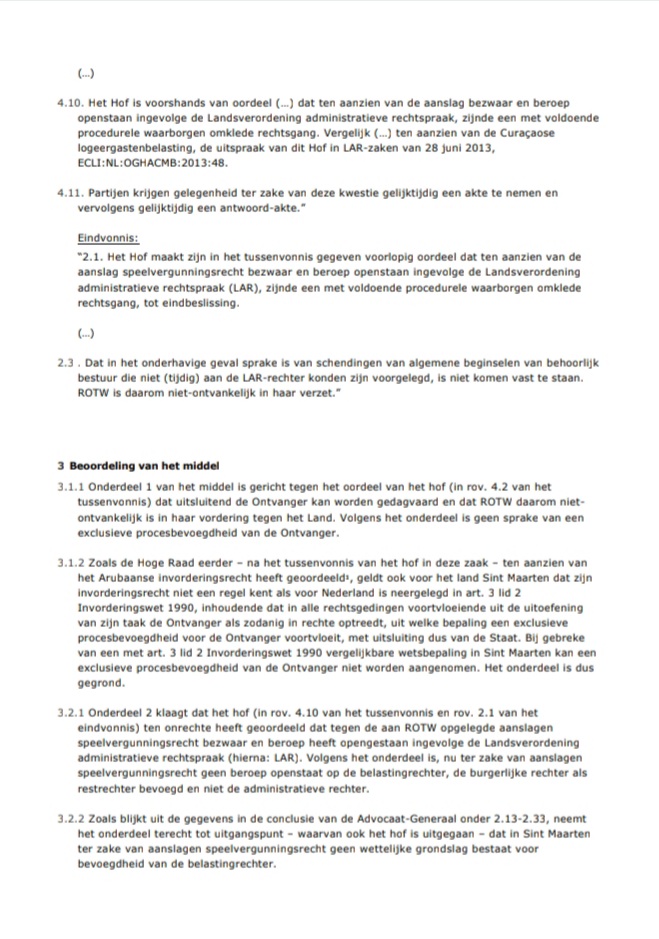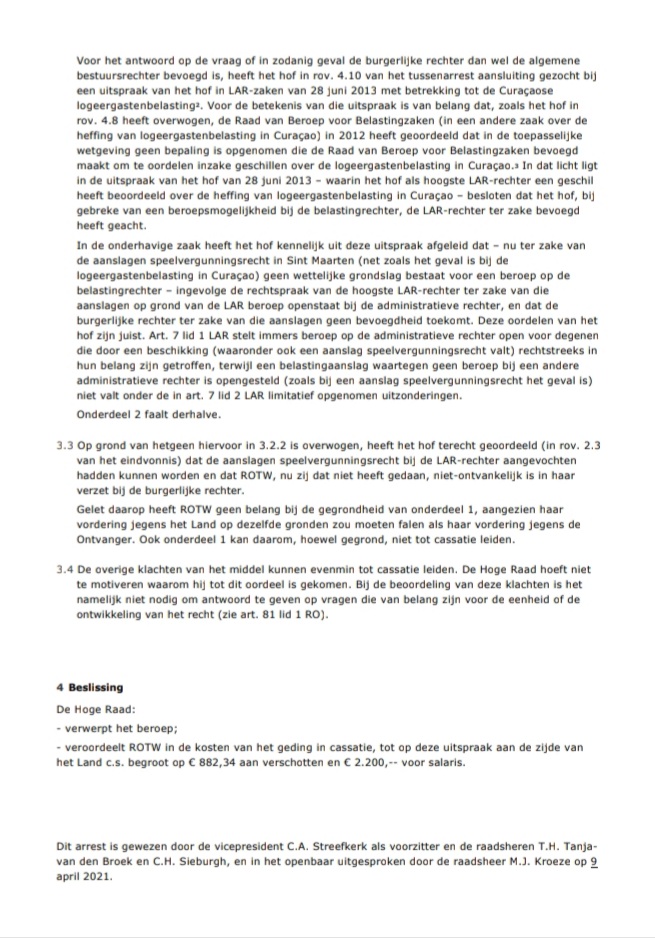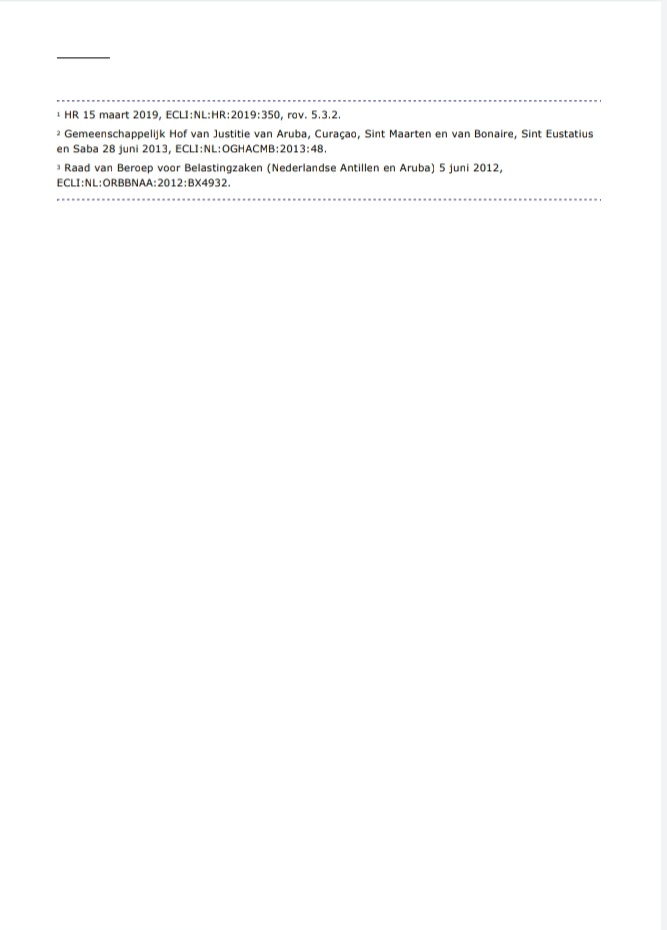lawyers: M. Littooij and MBA Alkema,
against
1. THE LAND OF SINT MAARTEN, having its seat in Philipsburg, Sint Maarten, hereinafter: the Land,
2. THE RECIPIENT OF THE COUNTRY OF SINT MAARTEN,
established in Philipsburg, Sint Maarten, hereinafter: the Recipient,
DEFENDANTS in cassation,
hereinafter jointly: the Land et al
lawyer: J. de Bie Leuveling Tjeenk.
1. Process course
For the course of the proceedings in factual instances, the Supreme Court refers to:
-
the judgment in case AR 2014/18 of the Court of First Instance in Sint Maarten of 21 July 2015;
-
the judgments in the case AR 18/14 – Ghis 78078 – H 77/16 of the Common Court of Justice of Aruba, Curaçao, Sint Maarten and Bonaire, Sint Eustatius and Saba of 17 November 2017 and 30 July 2019.
ROTW has appealed in cassation against the judgments of the court of appeal.
Het Land et al have concluded that the appeal should be dismissed.
The case was explained for Het Land et al by their lawyer.
The conclusion of the Advocate-General EM Wesseling-van Gent is to reject the appeal in cassation.
The lawyers of ROTW responded in writing to that conclusion.
2Principles and facts
The following can be assumed in cassation.
(i) On December 13, 2013, the Recipient has imposed an executory attachment against ROTW on items belonging to ROTW in respect of gaming license charges.
(ii) ROTW filed a notice of opposition to the Recipient on January 16, 2014.
(iii) The Recipient has honored the objection insofar as it concerns the collection of assessments imposed before December 2009, and has rejected the other objection.
(iv) The Recipient has suspended the execution but maintained the attachments.
In these proceedings ROTW claims that the opposition to the coercive recovery be declared well-founded. In so far as relevant in cassation, it argues that the assessments are in conflict with an undertaking made by (the legal predecessor of) the Country. Het Land et al. Defend themselves by relying, among other things, on the formal legal force of the attacks.
The court declared ROTW inadmissible in its claim against the Land and dismissed the claim against the Recipient.
The court has confirmed the court’s verdict. To this end, it considered as follows.
Interim judgment:
“4.2. The GEA has declared ROTW inadmissible in its claim against the Land. Ground 1 of ROTW is directed against this. The Court held on June 9, 2017 (AR 143/14-Ghis 79521-H 211/16), American University v. The Land and the Recipient, ‘that only the Recipient can be sued (compare ECLI: NL: HR: 2003 : AF3638) ‘(legal ground 3.5). The Court is now sticking to this. The complaint therefore fails.
(…)
For the time being, the Court of Appeal is of the opinion (…) that with regard to the assessment, objection and appeal are open under the National Ordinance on Administrative Jurisprudence, being a legal process with sufficient procedural guarantees. Compare (…) with regard to the Curaçao guest tax, the ruling of this Court in LAR cases of 28 June 2013, ECLI: NL: OGHACMB: 2013: 48.
The parties will be given the opportunity to simultaneously take a deed with regard to this matter and then simultaneously a deed of reply. “
Final verdict:
2.1. The Court of Appeal made its provisional judgment in the interim judgment that with regard to the assessment of the gaming license right, objection and appeal are open under the National Ordinance Administrative Jurisprudence (LAR), which is a legal process backed with sufficient procedural guarantees, until a final decision.
(…)
It has not been established that in the present case there are violations of general principles of good administration that could not have been (timely) submitted to the LAR court. ROTW is therefore inadmissible in its opposition. ”
3Assessment of the remedy
Part 1 of the plea is directed against the judgment of the court of appeal (in ground 4.2 of the interim judgment) that only the Recipient can be summoned and that ROTW is therefore inadmissible in its claim against the Country. According to the section, there is no exclusive standing of the Recipient.
As the Supreme Court ruled earlier – after the interlocutory judgment of the Court of Appeal in this case – with regard to the Aruban collection law 1 , it also applies to the country of Sint Maarten that its collection right does not have a rule as laid down for the Netherlands in art. 3 paragraph 2 Collection Act 1990, meaning that in all legal proceedings arising from the performance of his task the Recipient as such takes legal action, from which provision an exclusive legal standing for the Recipient arises, with the exclusion of the State. In the absence of one with art. 3 paragraph 2 Collection Act 1990 comparable legal provision in Sint Maarten, an exclusive legal standing of the Recipient cannot be assumed. The part is therefore well-founded.
Part 2 complains that the Court of Appeal (in legal ground 4.10 of the interim judgment and legal ground 2.1 of the final judgment) has wrongly ruled that objection and appeal are open against the assessments to play license law imposed on ROTW pursuant to the National Ordinance on Administrative Jurisprudence (hereinafter: LAR). According to the part, since no appeal is available to the tax judge with regard to assessments for playing license law, the civil judge has jurisdiction as residual judge and not the administrative judge.
As appears from the information in the Opinion of the Advocate General under 2.13-2.33, the part rightly takes the starting point – which the Court of Appeal also assumed – that in Sint Maarten there is no legal basis for the jurisdiction of the tax judge with regard to attacks. .
For the answer to the question whether in such a case the civil court or the general administrative court has jurisdiction, the court of appeal has in para. 4.10 of the interim judgment sought connection with a ruling of the court in LAR cases of 28 June 2013 with regard to the Curaçao guest tax 2 . For the meaning of that statement it is important that, as the Court of Appeal in par. 4.8 has considered that the Board of Appeal for Tax Affairs (in another case about the levying of guest tax in Curaçao) ruled in 2012 that the applicable legislation does not contain a provision that makes the Board of Appeal for Tax Affairs competent to rule on disputes about the guest tax in Curaçao. 3In that light, the decision of the Court of Appeal of 28 June 2013 – in which the Court of Appeal as the highest LAR judge has assessed a dispute about the levying of guest tax in Curaçao – has decided that the Court of Appeal, in the absence of an appeal to the tax judge, will LAR judge has deemed competent in this matter.
In the present case, the Court of Appeal has apparently deduced from this judgment that – now with regard to the assessments of the gaming license law in Sint Maarten (just as is the case with the guest tax in Curaçao), there is no legal basis for an appeal to the tax judge – in accordance with case law of the highest LAR court with regard to those attacks on the basis of the LAR, an appeal is available to the administrative court, and that the civil court has no jurisdiction with regard to those attacks. These judgments of the court are correct. Art. 7 paragraph 1 LAR, after all, opens an appeal to the administrative court for those who are directly affected in their interest by a decision (which also includes an assessment of a playing license right), while a tax assessment against which no appeal has been lodged with another administrative court (as is the case with an assessment for a playing license right) does not fall under the provisions of art. 7 paragraph 2 LAR exhaustively included exceptions.
Part 2 therefore fails.
On the basis of what was considered above in 3.2.2, the Court of Appeal has rightly ruled (in ground 2.3 of the final judgment) that the attacks on playing license rights could have been challenged before the LAR court and that ROTW, now that it has not done so, is inadmissible in its opposition to the civil court.
In view of this, ROTW has no interest in the merits of section 1, since its claim against the Country should fail on the same grounds as its claim against the Recipient. Part 1, although well-founded, cannot therefore lead to cassation.
The other complaints of the remedy cannot lead to cassation either. The Supreme Court is not required to state reasons why it reached this judgment. When assessing these complaints, it is not necessary to answer questions that are important for the unity or development of the law (see art. 81 paragraph 1 RO).
4Decision
The high Council:
– dismisses the appeal;
– orders ROTW to pay the costs of the proceedings in cassation, estimated until this judgment on the part of the Land et al. at € 882.34 in disbursements and € 2,200 for salary.
This judgment was passed by Vice President CA Streefkerk as chairman and judges TH Tanja-van den Broek and CH Sieburgh, and pronounced in public by Justice MJ Kroeze on April 9, 2021 .





